Joyce activated, issue 14
On Tuesday 19th July, Sex Matters launched a report on single-sex spaces at the House of Lords. This week I’m sharing my speaking notes for the event.
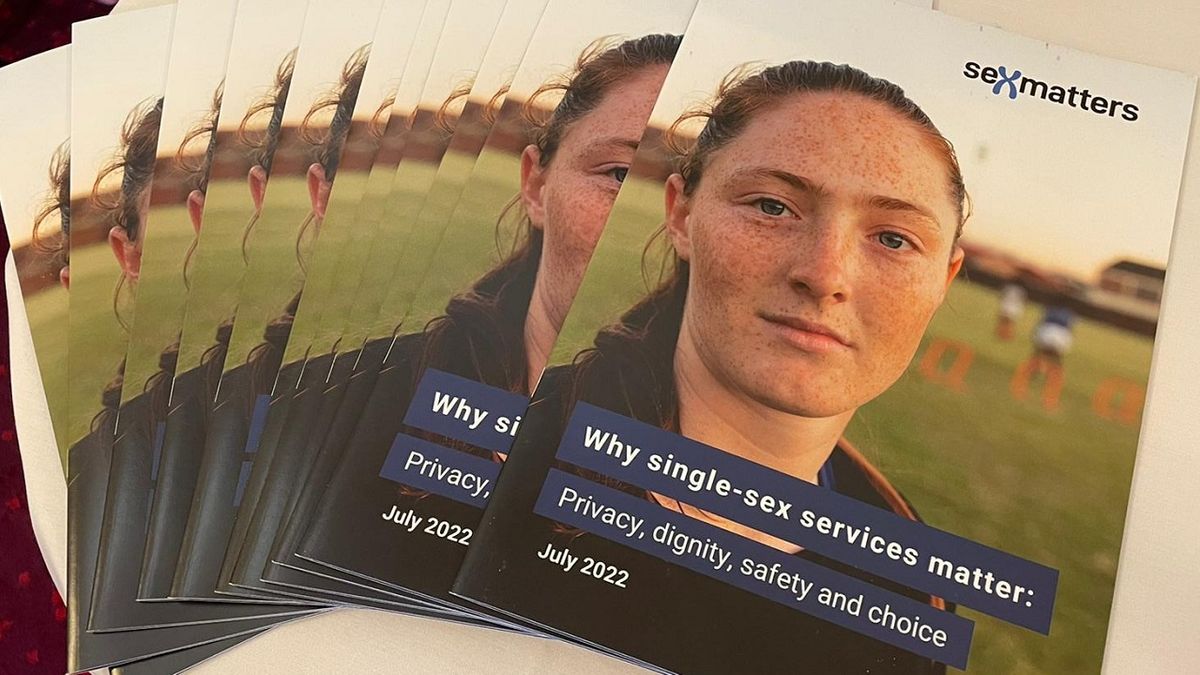
On Tuesday 19th July, Sex Matters launched a report on single-sex spaces at the House of Lords. Rather than return immediately to the subject of “toxic underlings”, this week I’m sharing my speaking notes for the event—and urging you all to read the report, whether in the short, medium or long version. The thousands of testimonies from ordinary people about how much single-sex spaces and services matter for women’s inclusion in public life provide a powerful human-rights argument for halting the trend towards making everything mixed-sex, whether by declaring spaces “gender-neutral” or by allowing men to use women’s spaces if they identify as women.
I’m Helen Joyce, author of “Trans: When Ideology Meets Reality”, a long-time staff journalist at The Economist, and currently on leave of absence to work with Sex Matters as director of advocacy.
Sex Matters welcomes all of you who braved the heat to join us, and who have either not caught Covid or have recovered. And thanks so much to our host, Baroness Anne Jenkin, a great advocate for women’s rights.
Sex Matters is a human-rights organisation with a singular mission to clarify law and policy on sex in the UK, in order to protect everyone’s rights. Its motto is: Sex Matters in life, and in law. It shouldn’t take courage to say so.
We were set up in 2020 by a group of lawyers and researchers, concerned about the confusion and misrepresentation of the law around sex.
We are closely associated with the “Maya Forstater” case, which created a precedent that the “sex-realist” belief—that sex is binary and immutable in humans, and that in some situations that matters—is “worthy of respect in a democratic society”. That means it’s a legally protected belief, and people should not be discriminated against simply for expressing it. Maya is the executive director of Sex Matters and this project was her brainchild. Frustratingly she can’t be here today—she is in bed with Covid.
Despite that legal protection, there is a culture of fear in which people who want to talk clearly and politely about the two sexes, male and female, and to distinguish between sex and self-declared gender identity, know that they risk a lot. Job loss, social-media mobbing and social ostracism. We have seen the Equality Act being misunderstood and misrepresented, and used against women rather than to protect them.
Sex Matters sees its job as normalising a much-needed debate. Giving people the language and evidence to talk about it. Taking down the heat and taking out the risk so that politicians, policy-makers, and anyone else who wants can discuss conflicts of rights and how they can be resolved in ways based in fairness, transparency and material reality.
Our view of sex and the law is in our little guide to sex and the law (which we will be sending to all MPs and peers)—we hope it gives more people the language to have these discussions.
The research we’re publishing today is into a vexed question: in an age of anti-sexism and formal equality of the sexes, do we still need any spaces that are separated by sex? And if so, why?
I’m old enough to remember a time when if you had asked for the most incontrovertible fact about humanity, you might have got “there are two sexes”.
Not everything that was put in the same package as that incontrovertible fact was perfect—I’m also old enough that our careers-guidance teacher in my Irish convent school asked girls who wanted to be doctors whether they meant “nurse”; and I was in the first year to which the school offered physics—the teacher was borrowed from the boys’ school my brothers attended, and constantly cracked sexist jokes as well as leaving out half the syllabus (I knew from my brothers that he was actually a good teacher, but he didn’t bother with us girls).
But it was also a time of opportunity. I got a PhD in mathematics—no thanks to that physics teacher. My younger sisters played cricket for Ireland, as did three of my brothers. And everyone understood that if women were to be able to play a full part in public life then the bedrock differences between boys and girls, men and women, not just the many ways in which the two sexes are the same, needed to be taken into account.
I studied mathematics alongside men—and graduated with a higher mark than any of the men in my year. But when I went to see a doctor I could ask for a woman, or a female chaperone. When I went out to a pub or a nightclub, the ladies’ really was just for women, and any pub owner or bouncer would have dealt smartly with any man who tried to go in.
My sisters were two of the best sportswomen Ireland has ever seen—but they played on women-only teams.
When I moved to multicultural England in my 20s I saw with approval that councils ran women-only swimming sessions so that Orthodox Jewish and conservative Muslim women could obey the diktats of their faith and still get some exercise.
I joined women-only groups at college, at work, and for friendship. Book groups. Women in mathematics groups. And then when my husband and I weren’t able to have children naturally, I turned to women-only infertility support groups. Men also suffer when they want to become fathers and can’t—but the physical and mental toll is not the same for the two sexes, and although my husband was a rock I still wanted to talk to other women going through the same thing as me, without any men around.
There were women-only helplines and shelters for women who suffered sexual or physical violence at the hands of men.
All these spaces and services, both everyday and specialist, were part of enabling women to play a full part in life.
None of them was a character reference for “all men”—plenty of men aren’t sexists who put women in mathematics down, and most men aren’t rapists. But some men are. And all men are, well, men—including the men who identify as women. They may need special accommodation if they’re unable to use men’s spaces—and I’m absolutely here for helping them to get it—but since no one can actually change sex, if their accommodation is in women’s spaces then those spaces stop being women’s spaces and start being mixed-sex ones.
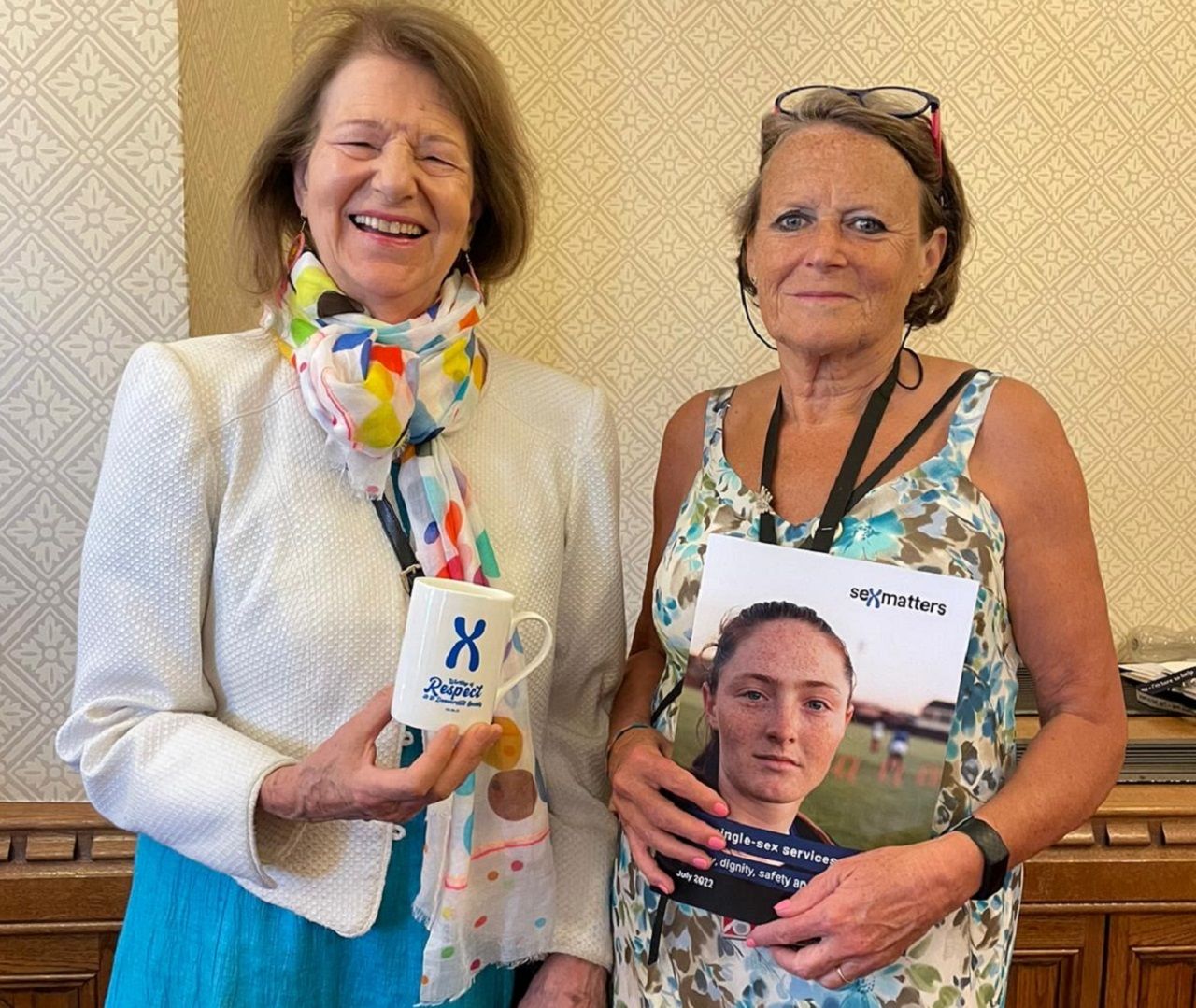
The justification for single-sex spaces for girls and women isn’t that men and boys have no needs. There are times people of both sexes want to be with just their own sex, whether that’s teenagers learning how bodies change in puberty; men wondering how to support a partner through IVF, or to talk about their own grief at infertility; women struggling to breastfeed—or Girls Guides, single-sex book groups, running or cycling groups, fantasy-football leagues and so on.
But here we are, ladies and gentlemen, in a strange world where all those single-sex spaces and services are being destroyed. Some of them are going formally mixed-sex—often under the euphemism “gender-neutral”. And lots of them are going “trans inclusive”, meaning that a person of one sex can use spaces and services that are supposed to be reserved for the other sex, if that is where they feel they belong. No consideration of what the other users think about where someone of the opposite sex belongs.
And this isn’t happening because single-sex spaces are no longer valued or needed. Polling by YouGov and focus groups by More In Common show that most people think single-sex spaces such as toilets and changing rooms are essential, and most people think that when we say single-sex, we meant people of the same sex—not people of the same self-declared gender identity.
When you ask about transwomen, that is male people—men who identify as women—competing in women’s sports, most people think it’s unfair on women and shouldn’t be allowed. When you ask if all public places should have separate toilets for men and women, they say yes. And most will say that they don’t think men who identify as women should be allowed into the women’s spaces.
From the point of view of the pollster or pundit, what matters is voting intention. Neither YouGov nor More in Common asked why people value these spaces—because it wasn’t their job.
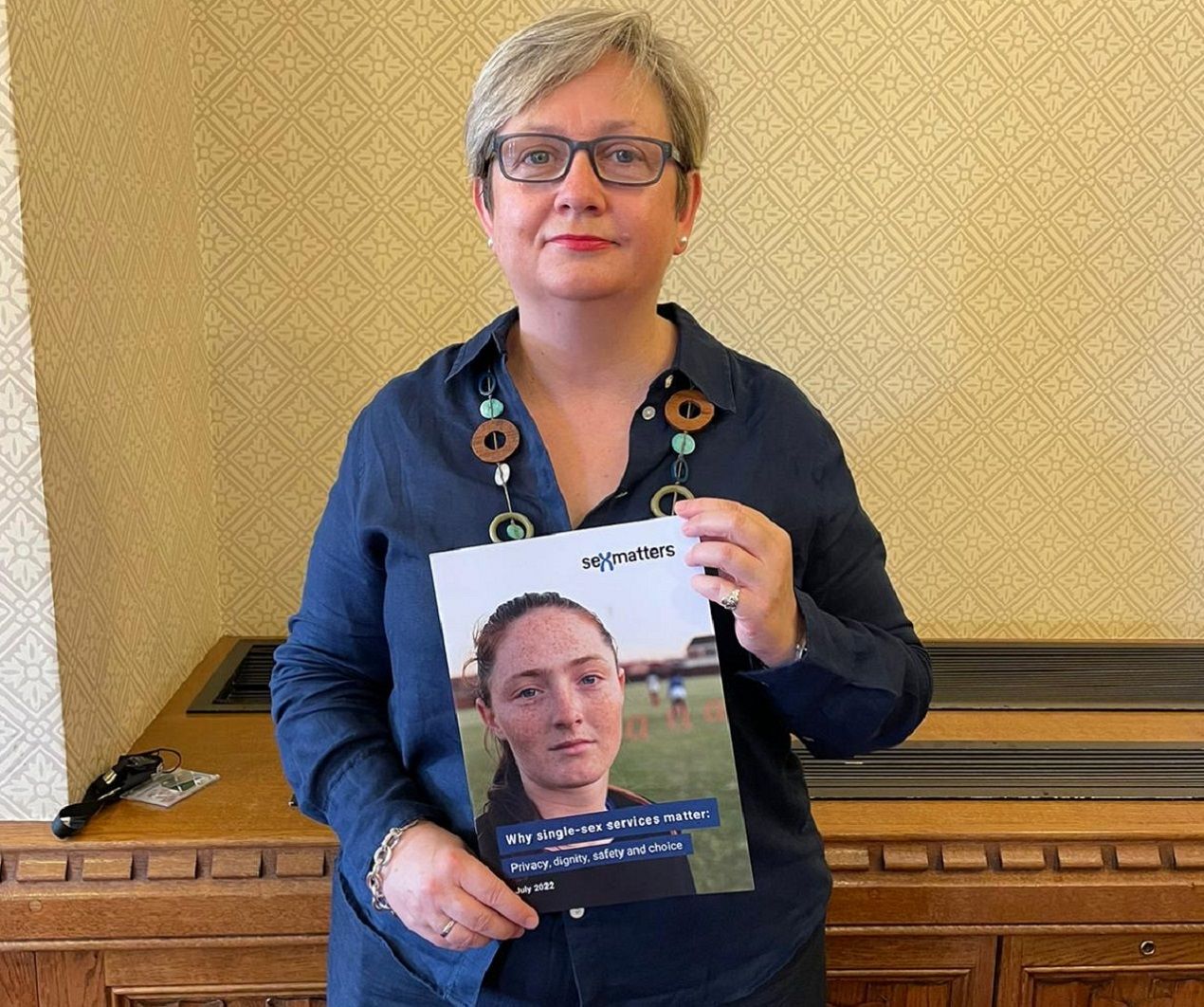
And that’s where this research we’re launching today comes in. In February Maya took the simple but radical step of asking people. She put together a questionnaire that started with whether you valued single-sex spaces and services and then guided people through from the basics—safety, privacy and dignity—and on to what sort of spaces and services they cared about.
She asked about their experiences in places where such spaces and services had been lost, whether because they had been shut down, or because they had gone formally mixed-sex, or because they had become so-called “inclusive”—meaning that a person of the opposite sex can enter if they satisfy some condition, or more usually just if they want to.
The questionnaire also asked for demographic information. Sex, age, location, political and religious affiliation, if any.
The research in the booklet you have is from the analysis of more than 6,000 responses from people in the UK who said they valued those spaces. This was not a representative poll—it wasn’t meant to be. It was a chance for us to hear from the people who care about single-sex facilities, and who aren’t being consulted—or in many cases even told—when it’s decided that these facilities are going to be destroyed.
90% of those who responded were women. Around half had at some point been victims of sexual assault, which is a lot higher than in the general population.
The strength of feeling was palpable. Each question generated around 300 pages of responses. Almost every time I spoke to Maya over the past couple of months she would say to me: the single-sex services survey is heart-breaking. Nobody is listening to these people.
As everyone who gets involved in this fight knows, you end up saying rude words rather a lot. We shouldn’t have to. I actually don’t mind; I am unembarrassable. But I shouldn’t have to. I shouldn’t have to tell you stories like those we heard from some of the women who replied to our survey. Their simple “no” should be enough.
The woman who walked into the ladies to find a man with his flies open, masturbating—and as soon as she walked in, he looked her in the eyes and ejaculated.
The woman who literally wets herself with fear when she finds herself alone in an enclosed space with a strange man, because of her trauma response from childhood sexual abuse.
The rape victim who had to leave her support group because a man who identifies as a woman joined, and now she cannot talk freely about her experiences of male victimisation.
The women whose male colleague has started to identify as a woman and to use women’s facilities—and who now all go up two floors every time they need a pee, but know that they can say nothing to HR, because they’re the ones who’ll face a disciplinary.
The girls whose parents have taken them out of Girl Guiding because the Guides now allow boys who identify as girls to join—and go camping, and share tents and shower rooms—with the girls; and men who identify as women to become Guide leaders.
And the men who mind, too. The men who don’t want to frighten women by appearing all of a sudden in a small enclosed space. The men who say they miss urinals—fast, easy to keep clean (I’ll bet the cleaners miss them as well)—but now urinals are gone and they have to queue. Or, even worse, they’ve been retained and women are supposed to use the same space—and no decent man wants to get his penis out and start weeing while random female strangers are walking past.
The people of both sexes who don’t want to have an intimate medical exam from someone of the opposite sex, and find the idea that they might be told someone is of the same sex as them and then turn up and find that they’re not a horrifying prospect.
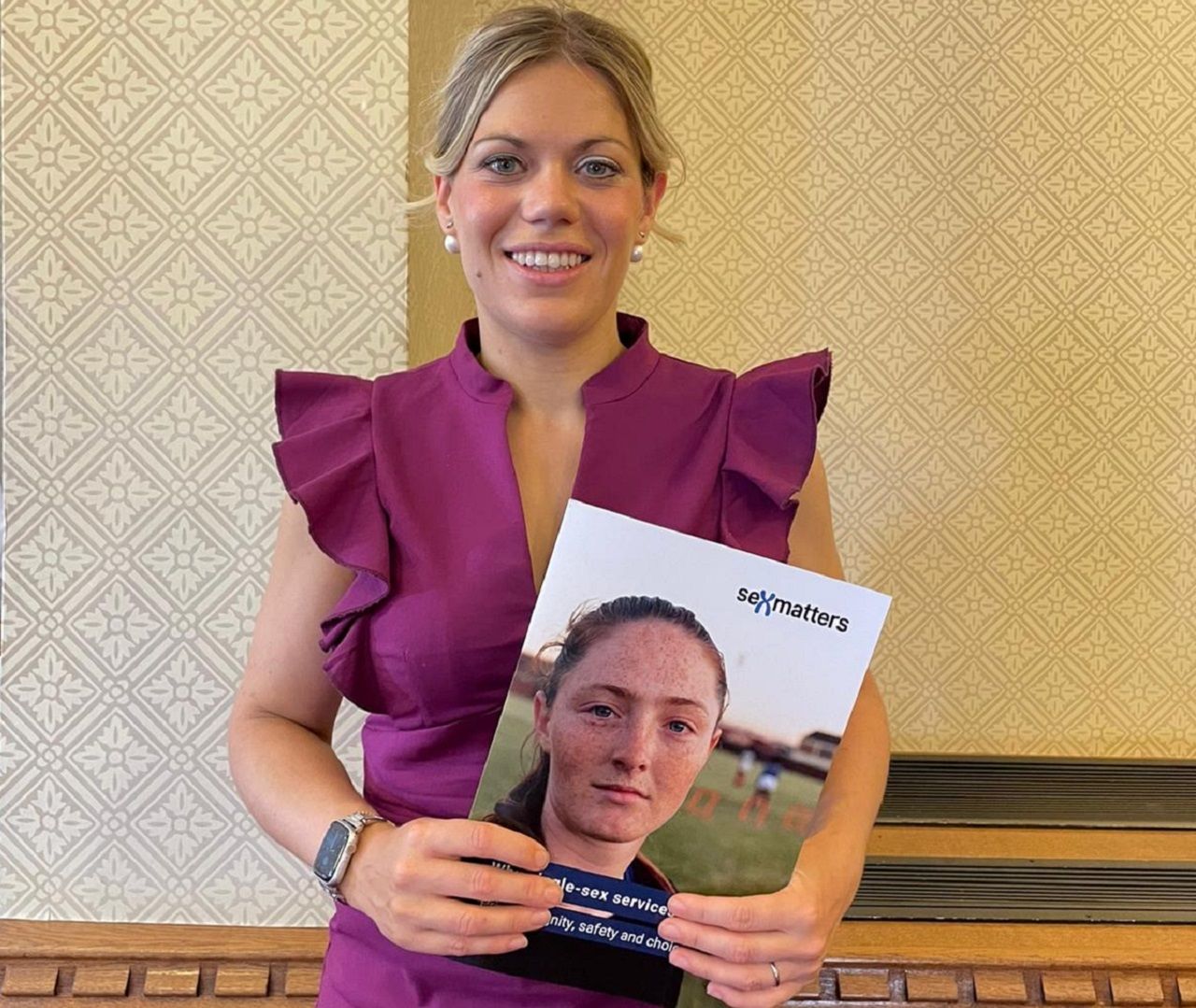
As well as the short report, we produced a the 30-minute read with greater detail, and a 140-page version that we, and others, will I’m sure be citing for years.
I read the two longer versions for the first time ten days ago. And there’s a short sentence that together with variations has been ringing in my head ever since:
“I never went back.”
Women who have left wild-swimming or leisure-cycling groups because a male person has joined, and suddenly, it’s not a comfortable place for women any more.
Women who said: I have a list of shops where I can’t use the changing rooms. Restaurants, pubs, theatres, art galleries that I don’t go to.
Women who said that men who identified as women had joined utterly inappropriate women-only spaces, such as breastfeeding or menopause support groups.
Woman after woman saying: I used to do this thing that I enjoyed, but now it, or the loos or changing rooms or sleeping accommodation that are an integral part of my being able to access it, has gone gender-neutral or trans-inclusive and I’ve stopped going.
I used to have more freedom. I used to have a fuller life. But without asking me, in thrall to a strange, evidence-free new ideology, the thing I enjoyed or needed changed in a way that excludes me.
I can’t use it any more.
I never went back.
The pollsters who’ve done research on this want to find out whether single-sex spaces are an electoral issue—whether the Red Wall cares, whether Labour are shooting themselves in the foot, whether the War on Woke is a sound political strategy, that sort of thing.
But we at Sex Matters see this differently. Of course it’s interesting and important—though frankly not at all surprising—that the majority position is the common-sense one that most people want single-sex spaces and services.
But suppose it wasn’t? Suppose only a minority cared?
Our perspective on this is the human-rights perspective. What do people, particularly vulnerable people, need in order to flourish? How can we ensure that minorities are fully included in public life? People with special needs, whether that’s people with disabilities, or women who are carrying trauma from sexual assault, or people from faith communities that require sex separation in some circumstances?
And how do we ensure safety, dignity and privacy for children in public places? That they are not exposed to adult situations too early, or even sexually assaulted? In other words, how do we safeguard?
Most women were first victimised by men when they were still children, most often by voyeurism or indecent exposure. I was about ten when a man swam under me at a swimming pool and grabbed my crotch, and fourteen when a man put his hand up my skirt on a bus.
It’s not at all unusual that I’ve had these experiences, I don’t need to ask to know that most of the women here have.
Those things happened to me in public places. Worse would have happened if those men had access to toilets and changing rooms too.
So we should be designing spaces where people get partially or completely undressed, where you’re off the beaten track, such as in a toilet block, to make these crimes more difficult. To put it bluntly, no little girl should ever have to use a toilet that a man can come into while she’s there.
And since most adult women have had such experiences, either as adults or as children, why do we talk as if the only sorts of services used by survivors—traumatised women, who’ve experienced the worst that men can do—are the specialist services for victims?
These women also use public toilets. They also want to try on clothes, get fitted for bras, go to the gym, shower before work on mornings that they cycle in. The design of all public spaces and services where women must undress partially or completely, or where close or intimate contact are involved, needs to be trauma-informed, because there are a heck of a lot of women carrying trauma.
I shouldn’t have to say any of these things. I can because I’m not traumatised. But I shouldn’t have to—and women who’ve been traumatised really shouldn’t have to.
Everybody knows that some men are creeps, and that all men are embarrassing to many women in places where nakedness is involved. Everybody knows this stuff, even though some people are suddenly pretending not to.
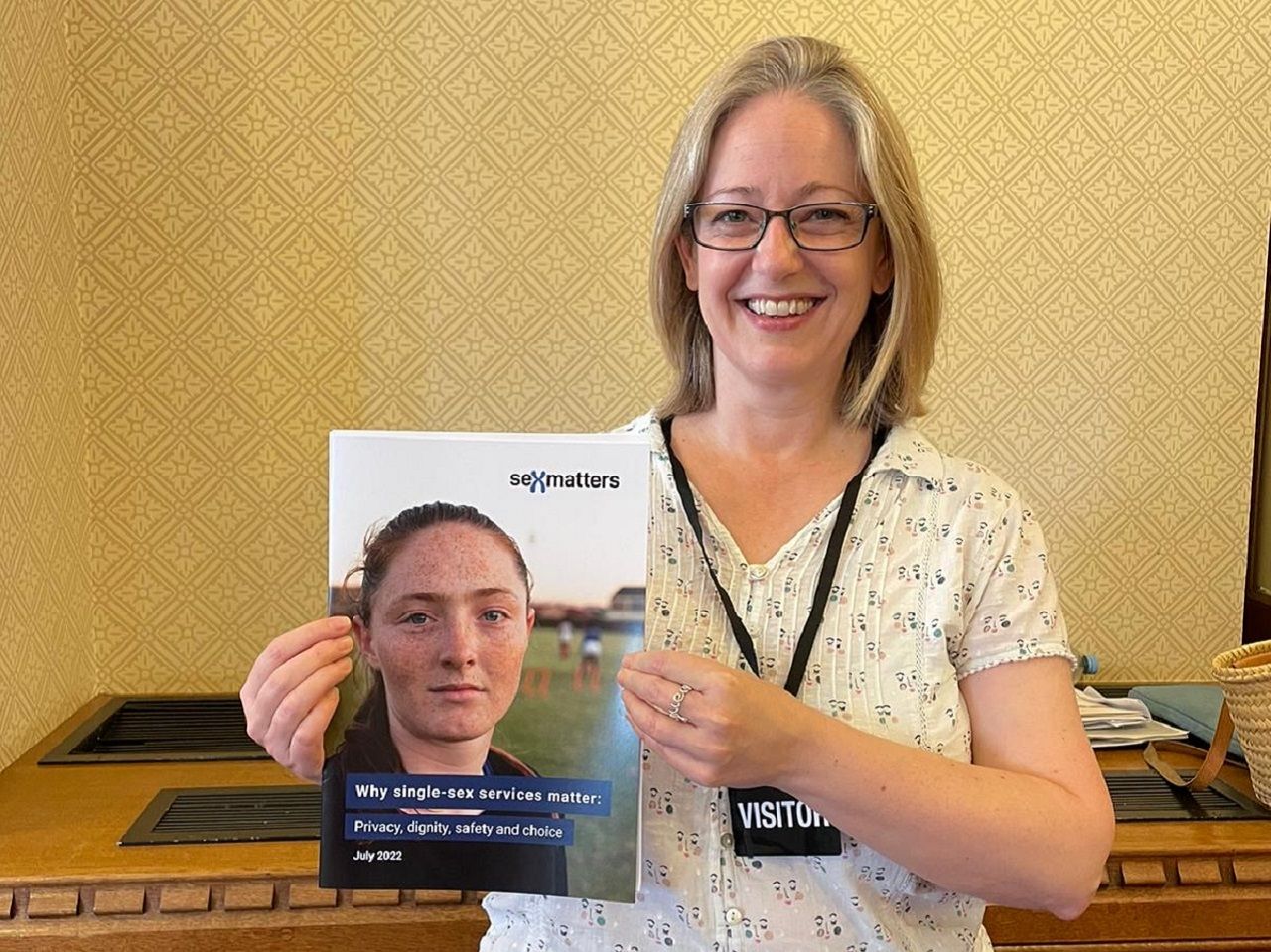
This isn’t a question of “majority rules”. Even if most or all adults were fine with it (and remember they aren’t, what I’m saying is: even if they were)—we should be thinking of these specific vulnerable groups first, and designing for them.
The second point about the human-rights perspective is that it’s big on consent. People have to consent to be viewed naked. To have other people’s naked bodies exposed to them. To receive intimate care. To be in close proximity in enclosed spaces where they are vulnerable. To discuss private matters.
For most people, the sex of the people around them makes a difference to whether they grant consent in at least some circumstances. A woman who is a rape survivor may consent to a cervical-smear test by a woman, but not by a man. How that man identifies will be irrelevant to her.
A man may consent to use urinals in the presence of other men, but not women.
A Muslim woman may consent to swim, or to adjust her hijab, or to wash her arms, in the company of other women, but not other men.
Speaking personally, I have consented to medical care from male doctors. But I do not consent to share changing rooms or shower rooms with a man, no matter how he identifies. If he’s naked, it’s indecent exposure. If I am, it’s voyeurism.
Even when there are separate cubicles, as in a mixed-sex block of toilets or change cubicles in a larger room, making the room mixed-sex will increase the incidence of accidentally-on-purpose “mistakes”.
And if access becomes according to self-ID, a man who identifies as a woman may not mean to injure me, but by being there he is overstepping my boundaries and the boundaries of any other woman there who cares about being in mixed-sex spaces.
Again, this is not about “majority rules”. One person cannot consent to intimate contact on behalf of another. My sex-based rights aren’t for other people to give away. Even if far fewer people said that these things mattered, they would still be non-negotiable for those of us for whom they do.
My final observation is that by destroying safe, well-designed, clearly signposted single-sex spaces, we are creating a public environment that, for women, mimics a high-crime one.
I lived in Brazil as a foreign correspondent between 2010 and 2013. It’s a very high-crime country. The worst that happened to me were a couple of minor assaults on the street, but people I knew were held up at gunpoint and knifepoint in their homes, in restaurants and on the street. In Rio people don’t stop at traffic lights at night, because that’s where you’ll get carjacked. The old centro of São Paulo, the city where I lived, is one of the world’s largest open-air crack dens. To visit government buildings or theatres, you had to get through these encampments.
It took me a year, but I got used to risk-assessing everything I did. It became second nature. I never walked anywhere with earphones in. I never went out without planning the journey there and back, and checking whether it would take me through anywhere risky. I was constantly alert to the people around me, aware of anything out of the ordinary, anyone approaching me too closely. There were many things I would have liked to do that I didn’t, because they would have been unsafe.
And that’s the experience we are voluntarily recreating for women! We are turning Britain into a country that will feel like a high-crime country for them.
A country where women have to remain alert and risk-assess in ordinary public places, like theatres, restaurants and gyms, when they use the toilet or changing facilities. Where they will decide not to do things they’d like to do because they know it’ll set their spidey-senses tingling. A country where the public sphere has been degraded. Where feeling safe and letting your guard down means retreating from the public sphere.
The other thing the pollsters sometimes say, along with the figures showing that most people agree there should be single-sex spaces, services and sports, is that this issue is low salience. People don’t mention it when they’re not prompted by the pollster, and they think that other things are more important even when they are.
That’s for two reasons. One, you may have noticed there’s a lot of stuff going on right now—a cost-of-living crisis; political chaos; an energy crunch; war in Ukraine.
But the second is: you do not know what you have until it’s gone.
Even in Brazil, where the economy regularly tanks and which has suffered a military dictatorship and hyperinflation in living memory, “segurança”—safety—is always near and sometimes right at the top of public concerns.
Any politician who thinks that women are not going to notice that their lives are heading towards being restricted—in the same way as in a country with a murder rate 20-30 times that of the UK—is going to be in for one big surprise at the ballot box.
If you appreciate the work I do, please consider signing up for my newsletter, which is published weekly on Thursdays.